DIY head porting
Moderator: phpBB2 - Administrators
DIY head porting
I'm going to start porting my cylinder heads whilst I am waiting for things to happen with my bottom end - balancing etc: my block is currently at the shop being bored.
It's a 3.9, and the pistons I am using are flat tops. I'm going to use early heads with 36cc chambers and composite gaskets to skim the heads afterwards to aim for 10.5:1 compression. I am aiming for (I think reasonable) 240/250bhp. I have not decided on a camshaft yet, but I won't be going beyond 7'000 RPM, and it's going into my road-going MGB so I don't want it to be completely undriveable, but as it won't see much traffic I can put up with a peaky feel. It might even see some track-day use.
I understand that Rover heads see a lot of benefit from opening up the throats and blending into the short side, which is fairly straightforward. I'm fairly confident about cc matching the chambers too (I have a burette).
I have a few questions:
I have read that the inlets need to be finished with a slightly coarse finish, and the inlets a polished finish. Is this correct?
I'm not certain about opening up the ports at the manifold because making them too big will have a detrimental effect on flow. If I open them out to the gasket, will this be too much? I may have an attempt at making a flow bench as per one of David Vizard's articles, and stop grinding when I stop seeing improvements at my desired valve lift? I have a set of heads to practice on.
I have also had a look for any pictures there may be showing where to grind, similar to ones my old man used for his TR6, but I can't find any. I have seen the posts on here with the sliced up cylinder head which are helpful in as much as I can see when to stop grinding. I wouldn't know what to do around the short side and the valve guide apart from polishing.
Also, the issue of valves and valve shrouding problem with Rover heads. I would go to the 1.63/1.4 inch valves, but I wonder if retaining the standard size valves would yield a better improvement for my desired output by keeping the valve unshrouded, away from the cylinder wall. I am using 95mm pistons, so larger than standard.
Any input and advice at all would be helpful.
Edit: Also, who supplies those valve guides with the step in them at the correct installed height to stop the guide dropping through? Thanks.
It's a 3.9, and the pistons I am using are flat tops. I'm going to use early heads with 36cc chambers and composite gaskets to skim the heads afterwards to aim for 10.5:1 compression. I am aiming for (I think reasonable) 240/250bhp. I have not decided on a camshaft yet, but I won't be going beyond 7'000 RPM, and it's going into my road-going MGB so I don't want it to be completely undriveable, but as it won't see much traffic I can put up with a peaky feel. It might even see some track-day use.
I understand that Rover heads see a lot of benefit from opening up the throats and blending into the short side, which is fairly straightforward. I'm fairly confident about cc matching the chambers too (I have a burette).
I have a few questions:
I have read that the inlets need to be finished with a slightly coarse finish, and the inlets a polished finish. Is this correct?
I'm not certain about opening up the ports at the manifold because making them too big will have a detrimental effect on flow. If I open them out to the gasket, will this be too much? I may have an attempt at making a flow bench as per one of David Vizard's articles, and stop grinding when I stop seeing improvements at my desired valve lift? I have a set of heads to practice on.
I have also had a look for any pictures there may be showing where to grind, similar to ones my old man used for his TR6, but I can't find any. I have seen the posts on here with the sliced up cylinder head which are helpful in as much as I can see when to stop grinding. I wouldn't know what to do around the short side and the valve guide apart from polishing.
Also, the issue of valves and valve shrouding problem with Rover heads. I would go to the 1.63/1.4 inch valves, but I wonder if retaining the standard size valves would yield a better improvement for my desired output by keeping the valve unshrouded, away from the cylinder wall. I am using 95mm pistons, so larger than standard.
Any input and advice at all would be helpful.
Edit: Also, who supplies those valve guides with the step in them at the correct installed height to stop the guide dropping through? Thanks.
- Pocket rocket
- Getting There

- Posts: 256
- Joined: Sun Nov 19, 2006 1:08 am
- Location: Hawkinge, Kent
I'll wait for the experts to give you a detailed reply but here are a couple of articles which may help whilst you're waiting..
http://www.popularhotrodding.com/engine ... index.html
http://www.allpar.com/fix/holler/head-porting.html
http://www.popularhotrodding.com/engine ... index.html
http://www.allpar.com/fix/holler/head-porting.html
- ged
- Forum Contributor

- Posts: 668
- Joined: Tue Feb 10, 2009 2:09 pm
- Location: North Wales via NZ
- Contact:
Hi ppyvabw,
I found this book helpful.
How to Power Tune Rover V8 Engines (By Des Hammill)
http://www.britishv8.org/Articles/Power ... ver-V8.htm
It has full size diagrams for standard & ported heads.
Regards Ged
I found this book helpful.
How to Power Tune Rover V8 Engines (By Des Hammill)
http://www.britishv8.org/Articles/Power ... ver-V8.htm
It has full size diagrams for standard & ported heads.
Regards Ged
Hi
Surface finish is normally recommended as that achieved by 120 grit emery both inlet an exhaust, some swear by 80 grit finish and some a two stage finish of 120 grit over 80 (like cylinder bor honeing) personally I would just go straight to 120 grit and not phaf about.
The short side is best left alpne beyond removing casting marks and blending in the valve seat unless you have a flow bench and 20 years experience of grinding heads match the heads to the inlet manifold using ceriel box card of drafting paper but take as little material out as you can.
match the heads to the inlet manifold using ceriel box card of drafting paper but take as little material out as you can.
Avoid opening out the inlet tract at the head face it really kills flow unless you are creating very high flow heads.
Inside the port at the point where the push rods go through is the most restrictive part of the port appart from the seat insert so concentrate on that area once you have bored and blended the seat insert.
Best regards
Mike
Surface finish is normally recommended as that achieved by 120 grit emery both inlet an exhaust, some swear by 80 grit finish and some a two stage finish of 120 grit over 80 (like cylinder bor honeing) personally I would just go straight to 120 grit and not phaf about.
The short side is best left alpne beyond removing casting marks and blending in the valve seat unless you have a flow bench and 20 years experience of grinding heads
Avoid opening out the inlet tract at the head face it really kills flow unless you are creating very high flow heads.
Inside the port at the point where the push rods go through is the most restrictive part of the port appart from the seat insert so concentrate on that area once you have bored and blended the seat insert.
Best regards
Mike
poppet valves rule!
After being recommended that book several times before, yesterday I finally looked for it on Amazon. It is out of print now apparently, so I have email notifications for if it comes available on Amazon again. There's a copy on 'the bay' that I'm watching out for.ged wrote:Hi ppyvabw,
I found this book helpful.
How to Power Tune Rover V8 Engines (By Des Hammill)
http://www.britishv8.org/Articles/Power ... ver-V8.htm
It has full size diagrams for standard & ported heads.
Regards Ged
250BHP will need bigger valves than the stock ones - standard valves will limit you to aorund 220/230 depending on the rest of the work on the engine. Just working the throats will get the flow up for the standard valves but the extra power available with the big valves will need to come from opening up the ports.
The Peter Burgess speedpro book is well worth having.
Andrew
The Peter Burgess speedpro book is well worth having.
Andrew
4.5L V8 Ginetta G27
Nothing required on the big valves and the chambers need very little work as the shrouding is minimal.
Andrewppyvabw wrote:Thanks for that info Andrew. I'll upgrade to the bigger valves then, and grind the chamber around the valves to de-shroud them.
I've read about modifications to the backs of the valves. What's needed in that respect?
4.5L V8 Ginetta G27
What order is best to do this?
Do the porting and then have the seats cut? That way I can get on with it - Something I don't have a lot of at the moment is money to buy valves and have the cutting done, but an awful lot of time.
Or have the seats cut first so I know how much I am opening out by. I am guaranteed to nick one or more the new valve seats this way though...
Do the porting and then have the seats cut? That way I can get on with it - Something I don't have a lot of at the moment is money to buy valves and have the cutting done, but an awful lot of time.
Or have the seats cut first so I know how much I am opening out by. I am guaranteed to nick one or more the new valve seats this way though...
Hi
if you are fitting bigger valves the seat inserts need opening out (they do to get the best out of standard valves) before anything else is done, otherwise how do you know what to blend the rest of the bowl to
I hate to say this but if you are looking for more power than a stage 1 porting job will give you then you will need the flow bench and an engine on a Dyno to develop the heads properly. You are looking for small incriments and changes in port shape to get the flow you are after. High flow big valve heads are not really something for the home porter to tackle. Stage 1s yes no problem if you are sensible then you should get good results, stage 3 and above are really for the profesional porter with several years of porting behind them. If you are going to do this yourself start with a slightly less ambitious target output and you have a very good chance of producing a good result.
Best regards
Mike
if you are fitting bigger valves the seat inserts need opening out (they do to get the best out of standard valves) before anything else is done, otherwise how do you know what to blend the rest of the bowl to
I hate to say this but if you are looking for more power than a stage 1 porting job will give you then you will need the flow bench and an engine on a Dyno to develop the heads properly. You are looking for small incriments and changes in port shape to get the flow you are after. High flow big valve heads are not really something for the home porter to tackle. Stage 1s yes no problem if you are sensible then you should get good results, stage 3 and above are really for the profesional porter with several years of porting behind them. If you are going to do this yourself start with a slightly less ambitious target output and you have a very good chance of producing a good result.
Best regards
Mike
poppet valves rule!
I have a spare set of heads from a 3.9 which look to be in good condition and would like to have them ported for my standard Vitesse engine.
What firm offers the best value for this, and how much? And what sort of improvement would I get?
What firm offers the best value for this, and how much? And what sort of improvement would I get?
Dave
London SW
Rover SD1 VDP EFI
MegaSquirt2 V3
EDIS8
Tech Edge 2Y
London SW
Rover SD1 VDP EFI
MegaSquirt2 V3
EDIS8
Tech Edge 2Y
Lets have a play. 
First off lest get the necessary tools together
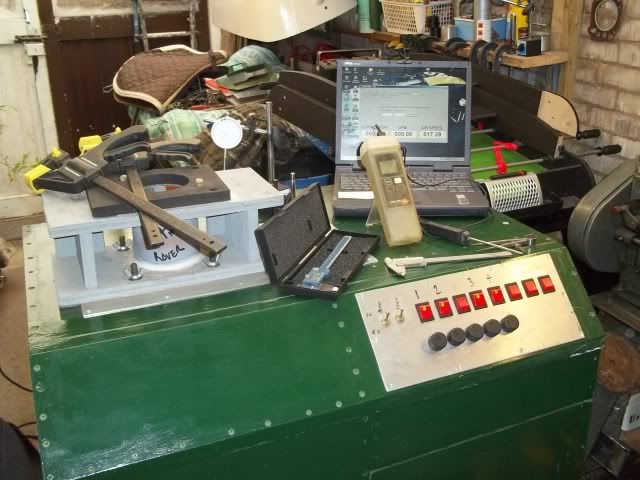
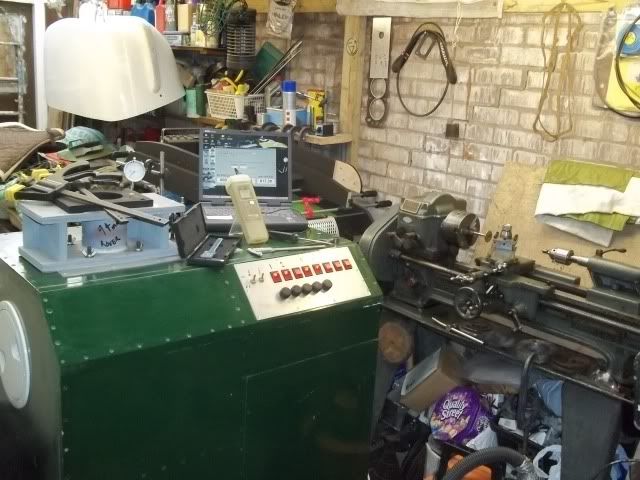
Something to test - at a reasonable size - it's a later head but not with waisted stems and one of the odd ones with the exhaust gas port things I wish I had a band saw.
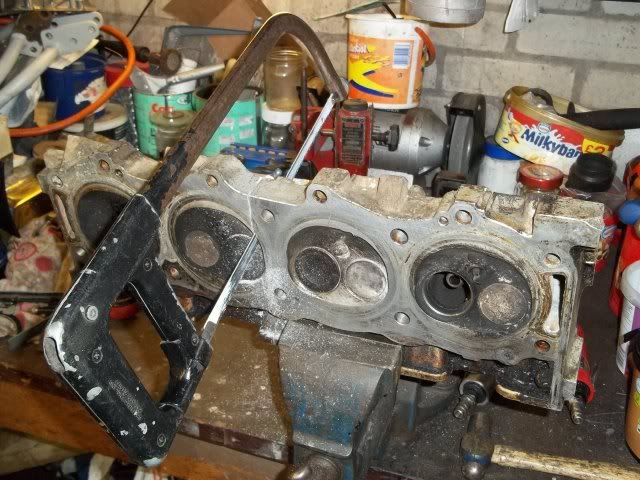
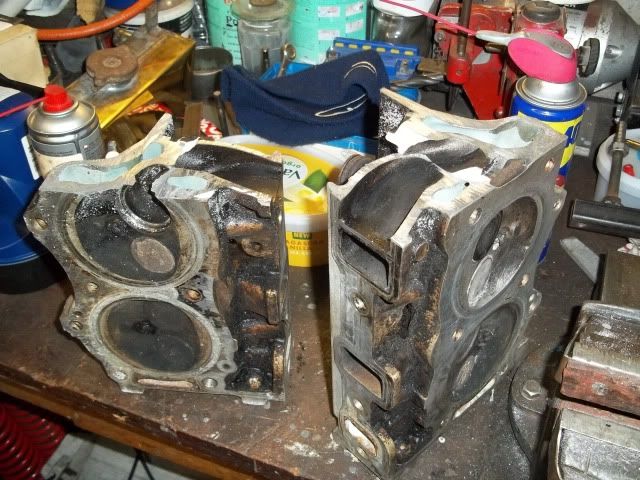
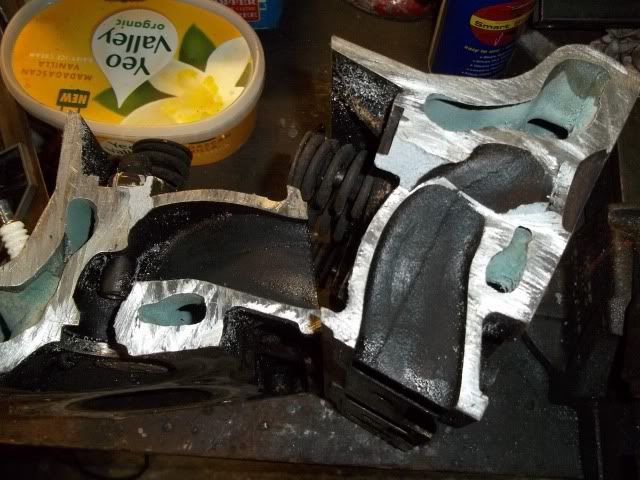
A couple of bits of scrap to work with.
Look at the amount of carbon in here
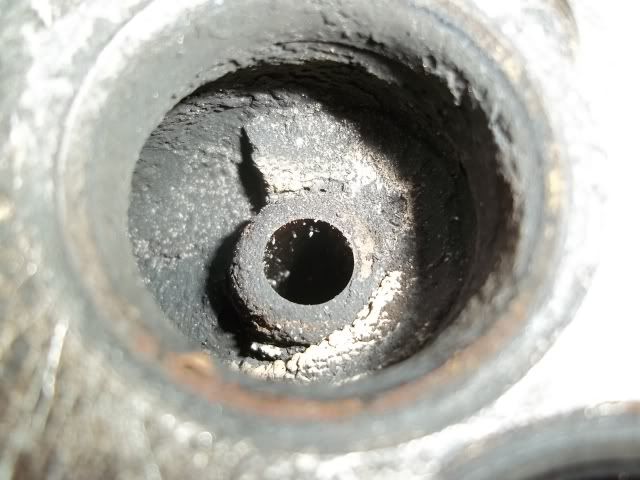
The one we will start with first
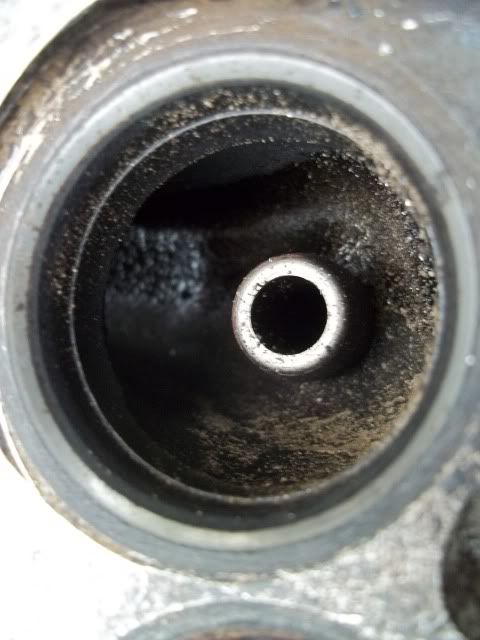
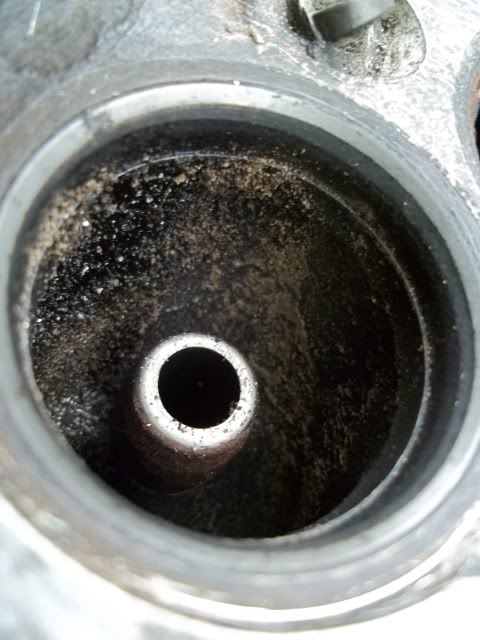
And a choice of valves
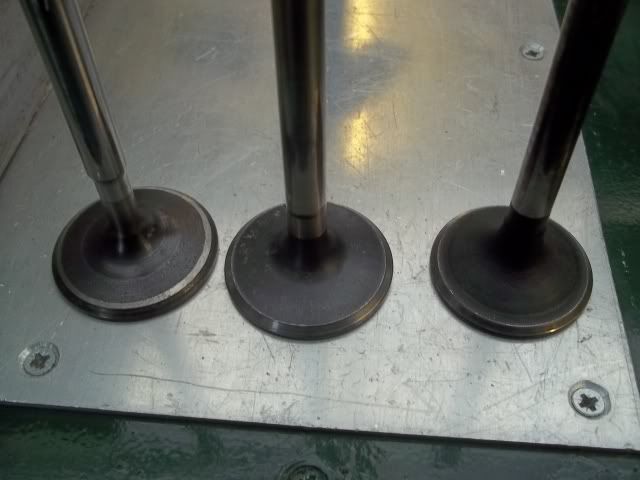
The standard valve and that silly ridge
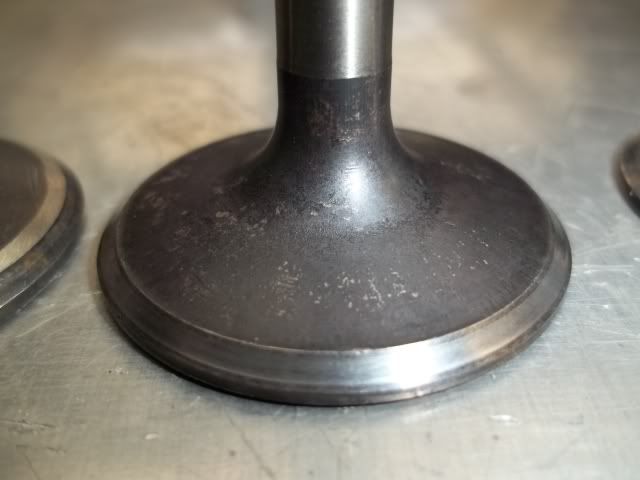
An open flow test with nothing in the port just to get a datum
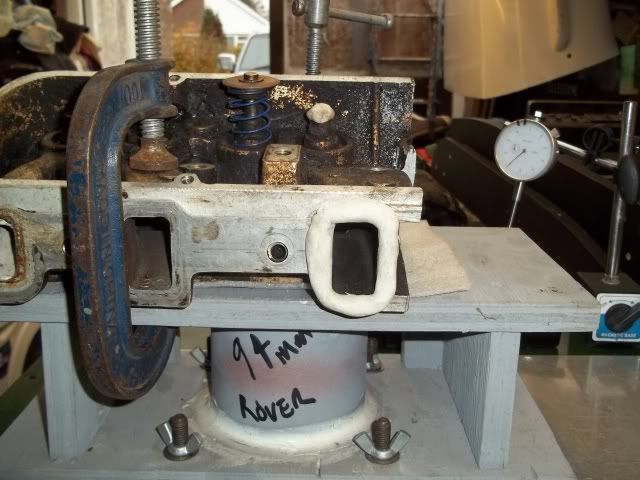
The first parts in the port that need to be removed - no changes to the seat internal diameter at this stage
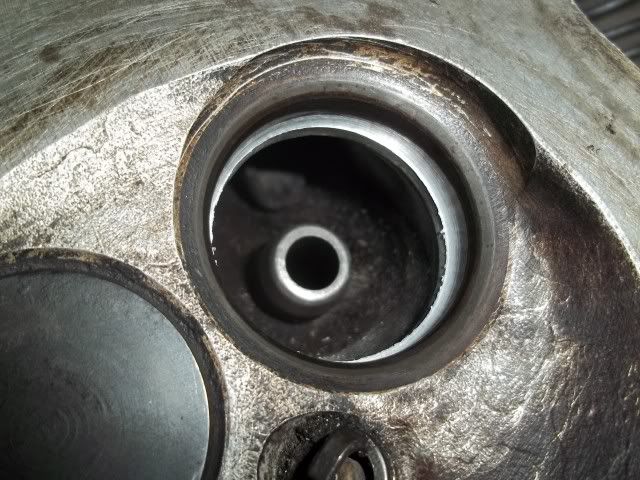
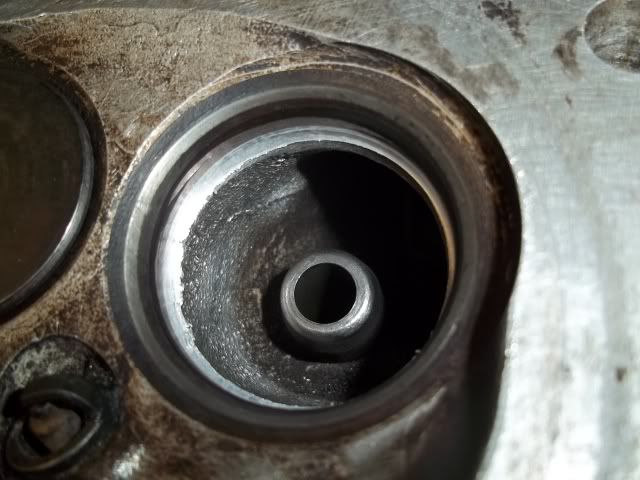
Thats got it started - see if i can get it progressed during the this week
A I have a base run with the standard head and valve
B run with the waisted valve with a cut back
C run with the waisted valve and a basic port blend std seat id at 34.7mm
D run with the waisted valve and the insert taken to 36mm and blended
Just need to combine the graphs.
But here are the flows at 450" - @ 28"
Open - 141.5
A= 134.5 cfm
B= 137.0 cfm
C= 138.9 cfm
D= 137.1 cfm
None of the porting work at present extends further than 3/4" into the port
Andrew
First off lest get the necessary tools together


Something to test - at a reasonable size - it's a later head but not with waisted stems and one of the odd ones with the exhaust gas port things I wish I had a band saw.



A couple of bits of scrap to work with.
Look at the amount of carbon in here

The one we will start with first


And a choice of valves

The standard valve and that silly ridge

An open flow test with nothing in the port just to get a datum

The first parts in the port that need to be removed - no changes to the seat internal diameter at this stage


Thats got it started - see if i can get it progressed during the this week
A I have a base run with the standard head and valve
B run with the waisted valve with a cut back
C run with the waisted valve and a basic port blend std seat id at 34.7mm
D run with the waisted valve and the insert taken to 36mm and blended
Just need to combine the graphs.
But here are the flows at 450" - @ 28"
Open - 141.5
A= 134.5 cfm
B= 137.0 cfm
C= 138.9 cfm
D= 137.1 cfm
None of the porting work at present extends further than 3/4" into the port
Andrew
4.5L V8 Ginetta G27
I can recommend Roy Burrell in Coventry he is retired but still does the odd bit of work
http://www.royburrellengines.co.uk/
Rovers are his speciality
http://www.royburrellengines.co.uk/
Rovers are his speciality
DaveEFI wrote:I have a spare set of heads from a 3.9 which look to be in good condition and would like to have them ported for my standard Vitesse engine.
What firm offers the best value for this, and how much? And what sort of improvement would I get?
4.5L V8 Ginetta G27




